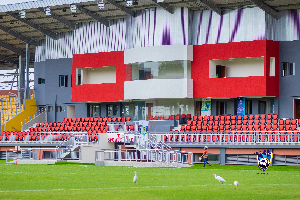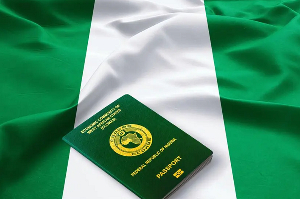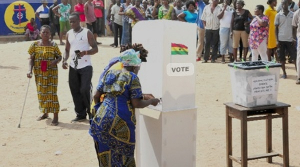- Home - News
- TWI News | TV
- Polls
- Year In Review
- News Archive
- Crime & Punishment
- Politics
- Regional
- Editorial
- Health
- Ghanaians Abroad
- Tabloid
- Africa
- Religion
- Election 2020
- Coronavirus
- News Videos | TV
- Photo Archives
- News Headlines
- Press Release
Photo Page of Saturday, 19 June 2004
Source: Heritage
JSS STUDENTS TAKE TO ?APIO?
Ghana may be breeding alcoholics as future leaders, if a recent survey conducted by the Blue Cross Society (BCS) of Ghana among Junior Secondary Schools (JSS) is validated. According to the General Secretary of BCS, Rev. David Obli, the survey revealed that one out of three JSS students drinks the local brew, akpeteshie, and the report suggests that the students apparently believe alcohol consumption is harmless.
The BCS is an international Christian non-governmental organisation (NGO) whose major activity is to create awareness of the dangers in the use of alcohol and hard drug. Its report on alcohol consumption in Ghana would be published in August this year. The BCS observed in its survey that most young people start drinking alcohol at the age of 10 and become addicted by the age of 18, drinking alcohol every other day. "Alcoholics do not represent any single group in the population", noted Rev. Obli. "They are professional people, government officials, tradesmen and women, executives, skilled craftsmen and workers. Alcoholism cuts across all lives and reaches all segments of society."
Meanwhile, information gathered by Weekend Heritage from various parts of the country reveals an increasing trend in alcohol consumption, which is impacting negatively on production, particularly in farming areas. For instance, reports reaching this newspaper indicate that farmers in the three northern regions - Upper East, Upper West and Northern - now exchange their products for akpeteshie. A local businessman informed Weekend Heritage that the akpeteshie is now virtually an unofficial "liquid currency" for purchasing products from the north. He said in this barter system of "cereals for akpeteshie," food crops such as millet, groundnut, yam and rice and animals such as sheep, goat and cattle are sometimes bought by middlemen from the southern sector of the country and paid for in cedis and barrels of akpeteshie.
Moving down south, farmers at Dodi Papase, a town with a population of about 6,000 in the northern half of the Volta Region, is also said to be experiencing poor harvest as a result of a rapid increase in the rate of "boozing". The picture is not different in the Greater Accra Region. Information pieced together from the Dangbe East District reveals that an average of about 20 outlets selling akpeteshie are located within a radius of two kilometres. At one point, eight drinking spots were counted around one church. So alarming is the situation in the area that concerned residents are saying men are abandoning salt winning, which is the main occupation in the area. The men are said to be perpetually involved in drinking akpeteshie at the expense of their work, so the women and children have taken over the salt winning to keep production running. This trend in alcohol consumption has led to the winning of salt being the preserve of women and children.
An International Christian Non-Governmental Organisation (NGO) The Blue Cross Society (BCS) of Ghana whose major activity is to create awareness of the dangers in the use of alcohol and hard drug, when contacted confirmed this. The BCS ' General Secretary, the Rev. David Obli, revealed that in a resent survey conducted by the BCS, it was realised that 1 out of every 3 Junior Secondary School student drink alcohol with the notion that it is harmless.










